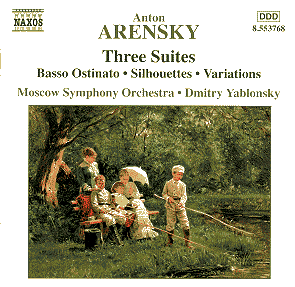Appearing through my letterbox not too long after
my most recent encounter with Yablonsky, it was difficult not
to harbour doubts about this release. I found Yablonsky’s version
of Prokofiev’s Alexander Nevsky utterly unremarkable (http://www.musicweb-international.com/classrev/2003/Aug03/Prokofiev_Nevsky.htm),
although my colleague Paul Shoemaker found delight in the sonics
of the same disc’s SACD incarnation (http://www.musicweb-international.com/classrev/2003/Sept03/Prokofiev4_lshoemaker.htm).
This Arensky disc appears to be a different matter,
musically speaking. Perhaps the fact that Arensky’s Weltanschauung
is uniformly happier than Prokofiev’s has something to do with
it: no trace of sarcasm or caustic wit here, nor of oppressive
affekt.
Arensky is one of those composers known more
for who he taught (Rachmaninov, Scriabin) rather than for what
he himself actually produced. Only his First Piano Trio of 1894
has really gained any sort of a place in any repertoire. Collectors
of Philips’ ‘Great Pianists of the Twentieth Century’ series may
already have husband-and-wife duo Bruk and Taimanov’s version
of the Suites for Two Pianos (456 736-2PM2); note both Suites
No. 2 and 3 on the present disc began life as piano duos. For
those interested in the byways of Russian music, then, there should
be much to savour here.
Indeed there is, and it is good to have these
1995 recordings at such a cheap price. The disc begins with the
Suite No. 2 (‘Silhouettes’), a series of five character
studies: Le Savant (The Scholar); La Coquette;
Polichinelle (Buffoon); Le Rêveur (the
Dreamer); La Danseuse (The Dancer). The first
movement begins with a pomposity most apposite to this parody
of an academic, later juxtaposed with delightfully spiky writing.
The movements complement each other well, the balletically smooth
stylisation of ‘Coquette’ setting off the active and comedic
‘Polichinelle’. The half-voiced strings for ‘The Dreamer’
are most effective, enhanced by the skilful addition of a harp.
An infectiously gay ‘Dancer’, full of Iberian influence,
rounds the suite off. There is almost a circus feel to the close,
a definite tinge of slapstick in the air. This is stylised, Russified
Spain of the highest order.
Expertly crafted in its own way, the First Suite
(in G minor, Op. 7) begins with a set of variations on a Russian
theme taken from a collection assembled by Rimsky-Korsakov in
1875/6. Certainly the opening statement, in bare octaves, is intensely
Russian. The prevailing feeling of grace and compositional competency
is continued throughout the five movements. The strings manage
the higher-lying parts of the ‘Air de danse’ second movement well.
The fourth movement of this Suite, ‘Basso ostinato’, is probably
Arensky’s most popular composition (having had exposure in several
piano anthologies). A pity the finale (‘Marche’) verges
on the pompous.
The Third Suite is actually a single set of variations.
Arensky is at his most imaginative in the quieter sections. The
delicacy of the fourth variation (a ‘Menuet XVIIIème
siècle’) calls Tchaikovsky’s ‘Nutcracker’ to
mind; the immediately ensuing Gavotte is pure joy. In fact
there is much delight to be gleaned from this piece, as indeed
from this disc as a whole. For anyone who wishes to explore the
output of this neglected composer, they need look no further for
a sound starting point.
Colin Clarke
